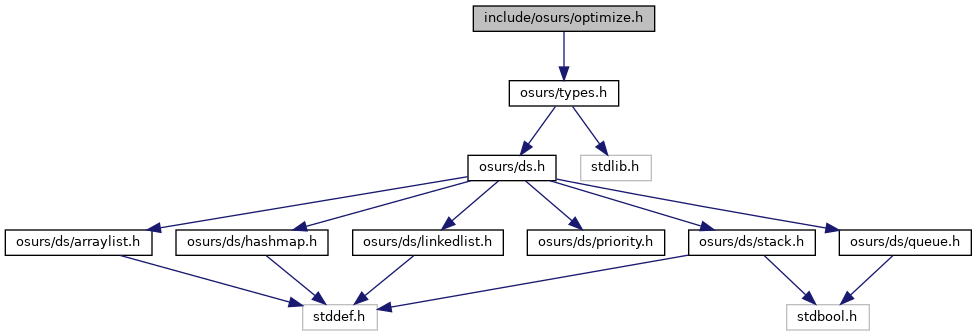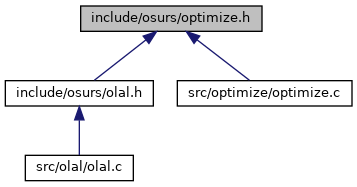Optimization of space utilization on routs. More...
#include "osurs/types.h"

Go to the source code of this file.
Functions | |
| Seat * | new_seat (int seat_id) |
| Create a new seat. More... | |
| void | seat_add_reservation (Seat *seat, int res_id) |
| Adds a new reservation to the seat. More... | |
| void | delete_seat (Seat *seat) |
| Delete a seat. More... | |
| SeatCollection * | new_seat_collection (int seat_count, int seat_ids[]) |
| Create a new seat collection. More... | |
| void | delete_seat_collection (SeatCollection *collection) |
| Delete a seat collection. More... | |
| int | space_available (unsigned int res_arr[], int res_count, int segment_count, unsigned int seat_count, unsigned int new_res) |
| Check if there is enough space available. More... | |
| SeatCollection * | optimize_reservation (unsigned int res_arr[], int res_arr_count, int res_ids[], int segment_count, int seat_ids[], int seat_count) |
| Optimize the reservations. More... | |
Detailed Description
Optimization of space utilization on routs.
This module contains an algorithm to optimally distribute reservations along a route to the available seats.
- Date
- : 2022-08-22
Function Documentation
◆ delete_seat()
| void delete_seat | ( | Seat * | seat | ) |
Delete a seat.
Frees the memory of the given seat on the heap.
- Parameters
-
seat The seat to delete.
◆ delete_seat_collection()
| void delete_seat_collection | ( | SeatCollection * | collection | ) |
Delete a seat collection.
Frees the memory of the given seat collection on the heap.
- Parameters
-
collection The seat collection to delete.
◆ new_seat()
| Seat* new_seat | ( | int | seat_id | ) |
Create a new seat.
Initializes the seat properties and allocates the memory for the reservation array.
- Parameters
-
seat_id The id of the seat.
- Returns
- Returns a pointer to the new Seat struct.
◆ new_seat_collection()
| SeatCollection* new_seat_collection | ( | int | seat_count, |
| int | seat_ids[] | ||
| ) |
Create a new seat collection.
Initializes the seat collection properties and allocates the memory for the seat array.
- Parameters
-
seat_count The Number of seats. seat_ids[] Array that contains all the seat ids.
- Returns
- Returns a pointer to the new Seat_collection struct.
◆ optimize_reservation()
| SeatCollection* optimize_reservation | ( | unsigned int | res_arr[], |
| int | res_arr_count, | ||
| int | res_ids[], | ||
| int | segment_count, | ||
| int | seat_ids[], | ||
| int | seat_count | ||
| ) |
Optimize the reservations.
Places the reservations on the seats in a way that optimizes the capacity.
- Parameters
-
res_arr[] The logical representation of each reservation. res_arr_count The number of reservations in the res_array. res_ids[] Array that contains the reservation ids segment_count The number of segments on the route. (stops - 1) seat_ids[] Array that contains the seat ids seat_count The number of seats in the composition.
- Returns
- Returns a pointer of the optimized Seat_collection.
◆ seat_add_reservation()
| void seat_add_reservation | ( | Seat * | seat, |
| int | res_id | ||
| ) |
Adds a new reservation to the seat.
Initializes the seat properties and allocates the memory for the reservation array.
- Parameters
-
seat The seat to which the reservation should be added. res_id The reservation id.
◆ space_available()
| int space_available | ( | unsigned int | res_arr[], |
| int | res_count, | ||
| int | segment_count, | ||
| unsigned int | seat_count, | ||
| unsigned int | new_res | ||
| ) |
Check if there is enough space available.
Checks if the given reservation fits into the current configuration.
- Parameters
-
res_arr[] The logical representation of each reservation. res_count The number of reservations in the res_array. segment_count The number of segments on the route. (stops - 1) seat_count The number of seats. new_res The logical representation of the new reservation.
- Returns
- Returns 1 if there is enough space available otherwise 0.